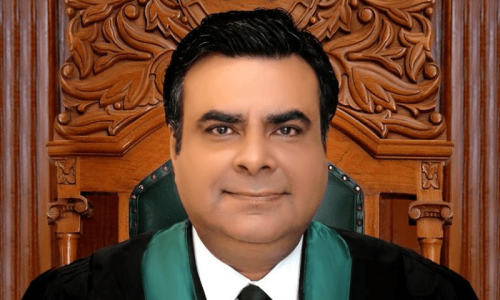RAWALPINDI, Aug 17: A team of Japanese International Cooperation Agency (JICA) is going to start a study for developing a regulatory mechanism in the catchment area of Nullah Leh to reduce the chances of floods in the Nullah, district government officials said here on Saturday.
The team would also study the environmental impact of development works at Nullah Leh and its catchment area.
The agency has signed a memorandum of understanding with the federal government for the project.
District Nazim Raja Tariq Kiyani told this reporter that the project was not connected to the ongoing expansion of the Nullah, which would however be linked to it at a subsequent stage.
The Asian Development Bank has financed the Rs1 billion Leh expansion project which envisages construction of bridges over Nullah Leh in Pirwadhai, Dhoke Chiraghdin and Gawalmandi; widening, desilting, deepening and channelization of the Nullah and dredging, stone-pitching and construction of a wall along its course.
The team, it has been learnt, would study the possibility of constructing dams, diversions and rainwater tanks for developing a suitable regulatory mechanism to reduce the chances of floods in Leh.
An expert said the volume of water flowing into Leh from Islamabad would increase in the coming years with increased urbanisation and decreased seepage, which necessitated a regulatory mechanism.
Currently, 56 per cent of Leh water comes from the neighbouring Islamabad.
It may be recalled that Asian Development Bank had asked the Punjab government to approach the federal authorities for getting the discharge of Islamabad’s untreated waste water into Nullah Leh stopped.
Experts believe that besides causing floods in Leh, indiscriminate discharge of untreated sewage into Leh is causing serious environmental and health problems through contamination of ground water.
According to a previous Japanese International Cooperation Agency study, the cities and suburbs of Islamabad and Rawalpindi form the Leh catchment area.
Four small streams, Saidpur, Kantiwali, Tenawali and Bedranwali Kas, originate in the Margalla Hills, cross Islamabad where untreated sewage enters in the water due to a faulty sewerage system. These streams converge upstream in Khayaban-i-Sir Syed to form the Leh, which then passes through Rawalpindi.
Meanwhile, at a meeting, the district Nazim has warned all the agencies and contractors working on the Leh project that they must “roll up their sleeves” for completing the project by the March 31, 2003, deadline.















































Dear visitor, the comments section is undergoing an overhaul and will return soon.